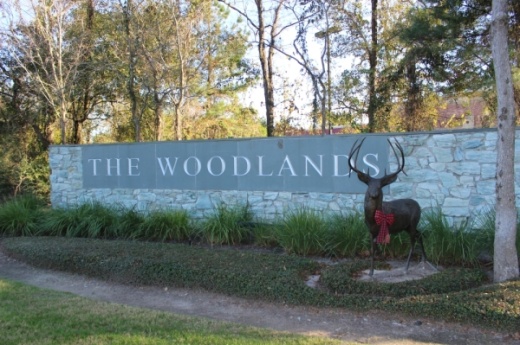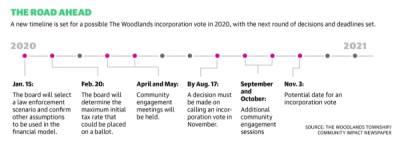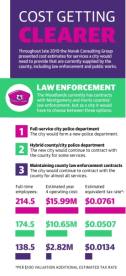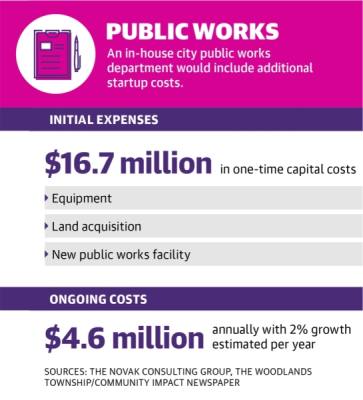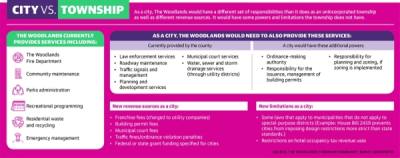Under state law, a majority vote is required for residents to approve incorporating into a city.
Legislation and agreements passed in 2007 created The Woodlands Township as a special-purpose district, meaning it cannot be annexed by Houston or Conroe until 2057. The township can incorporate into a city before that time, according to the legislation.
Throughout 2019, the study—for which the township had budgeted about $933,000 in 2019, according to township records—provided cost projections for services the new city would need •to supply—such as law enforcement and public works—currently provided by Harris and Montgomery counties.
However, some residents and former board members have expressed reservations about what they call a rush to vote and questioned whether the cost to residents would be worth it.
“I’m surprised to see the current board is moving so fast to have this incorporation vote, and I haven’t had anyone identify what problem we’re solving or what risk factor we’re identifying,” former Township Chair Bruce Tough said. “There’s a push for some reason and no benefit to be gained.”
Current Chair Gordy Bunch said he believes residents would evaluate whether the benefits were worth the potential added cost. He said the benefits of incorporation would include local control over infrastructure such as roads, being eligible for federal and state funds designated for municipalities, the ability to create ordinances and law enforcement authority.
“The timing for incorporation is completely up to our residents, and I am proud of our board of directors, staff and consultants work to provide an executable transition plan that can be implemented next year or any time prior to 2057 when our residents decide they are ready,” Bunch said.
Setting the tax rate
The last major decision the board must make before Novak can determine the maximum initial tax rate for incorporation is to select a law enforcement scenario to include in the financial model. The maximum initial tax rate must be determined before incorporation can be placed on the ballot. The deadline for placing the measure on the November ballot is Aug. 17.
An estimated maximum tax rate has not been presented by Novak, but the law enforcement scenario the board adopts could itself account for $0.0134 to $0.0761 per $100 valuation, according to Novak’s projections in December.
Under a revised schedule presented in December, the law enforcement decision will be made Jan. 15, and a maximum initial tax rate will be established Feb. 20. These will be followed by community information sessions in the spring.
The current township tax rate for fiscal year 2019-20 is $0.224 per $100 of valuation. The board was split during its budget talks in August before ultimately deciding not to raise the tax rate to accommodate increases in several annual contract costs.
The threat of a higher tax rate is one reason residents might balk at incorporation, said Nelda Blair, who was the board chair when the township formed in 2007. Blair said in a December interview she does not think incorporation is necessary.
“The residents have already indicated they do not want to incorporate if it costs us more in taxes, which it will, and if there are not overwhelmingly higher benefits, which there are not,” Blair said.
A 2016 survey conducted by the township indicated that 70% of respondents with an opinion about incorporation said it should not become a city within the next five years.
Township Director John Anthony Brown said a higher tax rate is possible, but he believes residents may find other values in incorporation.
“Some people may find that the cost is not worth it, while others may find that it’s a small price to pay to control your own destiny,” Brown said.
Director Brian Boniface said an increase could be partially offset by other benefits.
“There are tax options open to municipalities ... that can be redirected back to us to help minimize any rate increase, but we are operating with the understanding that the township tax rate will go up; how much we currently don’t know,” he said.
Law enforcement, county services
The law enforcement options the board will consider at its Jan. 15 meeting are keeping the current law enforcement contracts with Montgomery and Harris counties intact, creating a new full-service city police department, or using a hybrid of the two.
The estimated annual new net operating costs of those services for the fourth year after incorporation, according to Novak, is $2.82 million for keeping the current contract service, $10.65 million for the hybrid and $15.99 million for the full-service model.
A full estimate of the cost of incorporation has not been released by Novak pending completion of the study.
The township currently contracts with the Montgomery County Sheriff’s Office and with the Harris County Precinct 4 Constable’s Office to provide services. Using county services means certain administrative costs and support services are borne by the county at large, whereas a city department would need to start from scratch with office and support staff, Novak representatives said.
Bunch said additional expenses would be partially offset by new revenue.
“Most of our residents do not realize we fund 90% of our sheriff and constable deputies that patrol The Woodlands, purchase their vehicles and cover their normal overhead,” Bunch said. “There will be more costs but not nearly as impactful had we not already budgeted and funded law enforcement resources to the levels we do today.”
The township’s public safety budget for FY 2019-20 is $14.56 million, an increase of 4.1% from the previous year.
Brown also said new revenue-generating opportunities could reduce overall costs.
“While going through this study we found a lot of revenue out there that is not collected by the township that could actually subsidize some of the overall costs, such as an alcohol tax, franchise tax and any fines associated with law enforcement, such as speeding tickets,” Brown said.
For example, the Novak study projects $966,000 in revenue from a mixed-beverage tax if incorporation began in 2021, and $7.8 million in franchise fee revenue annually in years after the first year.
Reports from Novak also included projected costs for services the city would need to provide that are currently managed by Montgomery and Harris counties. These include public works and pavement and bridge maintenance.
For example, financial models presented in September indicated an initial $21.3 million expense for a public works department—$16.7 million from the capital fund for one-time costs and $4.6 million from the general fund for ongoing operational costs.
Bunch has stated the lack of power the township has over its roads is one of the factors that triggered the current incorporation study because of projects opposed by The Woodlands that were included in the Montgomery County Major Thoroughfare Plan in 2016.This includes a proposed Woodlands Parkway extension from FM 2978 to Hwy. 249.
“Public works will be a new additional expense as we gain authority over our roadways, and I believe it is a price our residents will evaluate paying in order to protect the community from major thoroughfare projects like the Woodlands Parkway extension, Gosling and Branch Crossing extensions,” Bunch said.
The annexation question
A topic that continues to elicit differing views from board members is whether incorporation is needed to prevent future annexation.
Under legislation approved in 2007, The Woodlands entered into Regional Partnership Agreements with the cities of Houston and Conroe, which will prevent those cities from annexing The Woodlands until 2057.
However, according to another state law approved by Texas legislation in 2017, annexation from Houston or Conroe could not take place unless it was approved by voters even after 2057. This is the crux of the argument for many residents who believe incorporation is not necessary.
New board member Shelley Sekula-Gibbs, who took office in December, said she feels there is some question of how the new state laws will apply.
“These new state laws may not apply to the [RPAs] signed by the cities of Conroe and Houston and the township in 2007,” Sekula-Gibbs said. “Texas judges have tended to favor laws that were in place at the time a contract was signed.”
Bunch, who has said the threat of annexation is not what prompted the current incorporation study, nonetheless said he felt incorporation would be a certain remedy for any theoretical possibility of annexation.
“[It] is the only way to 100% eliminate Houston and Conroe’s annexation rights through the RPA contracts our voters approved in 2007,” Bunch said.
He said the uncertainty of future laws has spurred debate on this topic.
“The confusion comes from trying to predict what annexation laws would be in effect 38 years from now versus the absolute 100% way to eliminate Houston and Conroe’s annexation rights via incorporation or formation of an alternative government,” Bunch said.
Director Ann Snyder said she believes annexation is no longer a threat.
“Any benefits of incorporation must be worth the additional costs,” Snyder said. “Residents should also consider the benefits of not incorporating but rather remaining a special-purpose district.”
This article ran in the January 2020 edition of The Woodlands. Read the full e-edition here.




